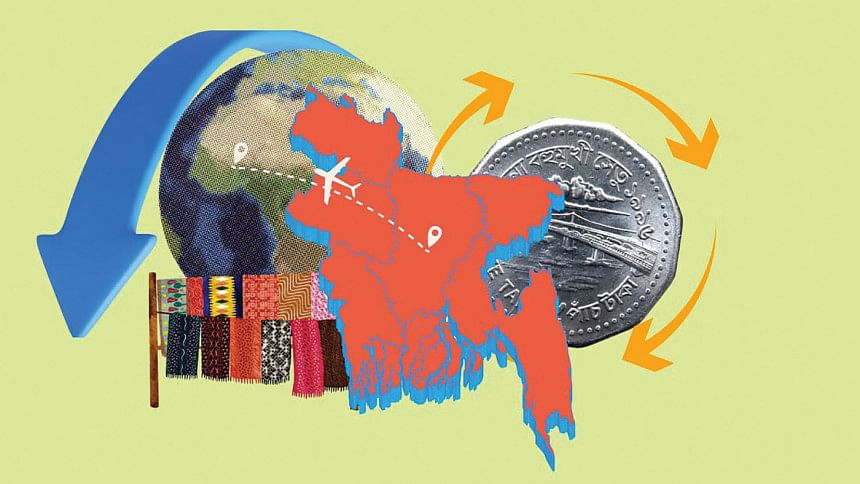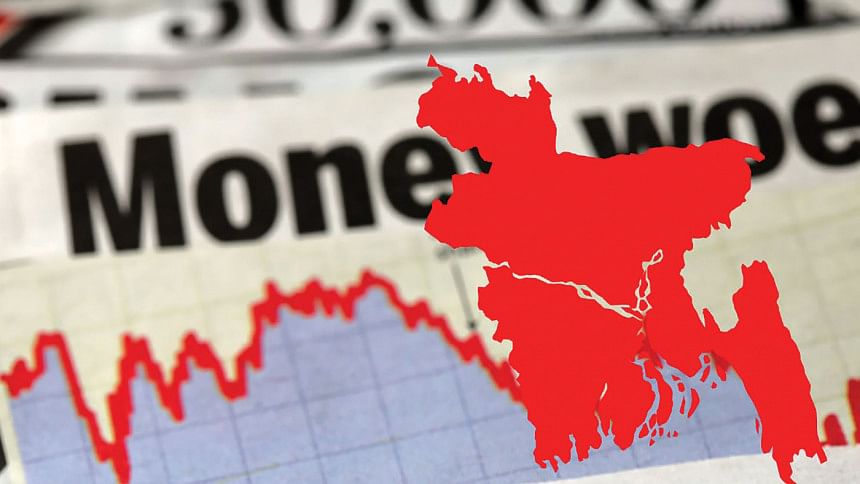On the road to the trillionaire’s club

Today, Bangladesh boasts an impressive GDP size of $455.2 billion, estimated to be the 33rd biggest economy in the world in nominal terms, and is ranked 25th in the world in terms of purchasing power parity (PPP). According to HSBC and others, Bangladesh looks to be on track to become the biggest mover in the economic rankings in the near future—to become the 28th largest economy by 2030 and the 25th in 2035.
In 2019, right before Covid-19 hit, the Asian Development Bank said that Bangladesh had achieved the fastest economic growth in the Asia-Pacific—comprised of 45 countries—in FY2018-19 at 7.9 percent, and could have possibly achieved a growth of 8 percent had the pandemic not hit. Mastercard recently predicted that Bangladesh will be the second fastest growing economy in the year 2024 among 46 countries—from different regions—that are all fighting hard to recover post-pandemic. I can go on and on about the many impressive economic achievements we have made in recent years, or are on the cusp of making. However, one in particular may stand out from the others. And that is, Bangladesh's dream of joining the trillionaire's club.
As of 2023, the "trillion-dollar club" included only 19 countries of the world. In late 2022, a study released by the American consulting firm Boston Consulting Group (BCG) revealed that Bangladesh was on course to emerge as a $1 trillion economy by 2040 if the country grew at an average rate of 5 percent—powered by a surge in middle and affluent consumers, which could drive the domestic consumer market to become the ninth-largest consumer market in the world, as predicted by HSBC also. With an average annual economic growth of 6.4 percent between 2016 and 2021, achieving an average growth rate of 5 percent sounds more than doable for Bangladesh. And what sounds even more enticing—although perhaps somewhat unrealistic without significant reforms and even luck going our way—is the fact that Bangladesh could realise this impressive milestone by 2030 if it manages to achieve an average GDP growth of 10 percent.

Just prior to the 15th Brics Summit, Prime Minister Sheikh Hasina said (in August 2023): "I have a dream; the 170 million people of Bangladesh have a dream. And that is, to become a trillion-dollar economy and a fully developed smart nation by 2041." And that dream, surely, is shared by all Bangladeshis, as the prime minister rightly said. According to the Federation of Bangladesh Chambers of Commerce & Industries (FBCCI) president, Bangladesh can achieve that dream much before 2040 because of infrastructural developments, economic growth momentum and confidence and indomitable spirit of local entrepreneurs. And the word confidence is key here.
BCG in its previously mentioned report said that, "consumer optimism in Bangladesh is high. This vital optimism kicked off the virtuous cycle of high growth which Bangladesh has experienced over the last decade." And, similarly, this optimism will be crucial in continuing to turn the wheel of economic growth.
As with all stories, Bangladesh's economic story has not been without its ups and downs. The recent economic climate—both globally and domestically—has created a number of uncertainties. The liquidity challenges facing many of our banks and businesses, the ongoing foreign exchange risks and the tremendous inflationary pressures on ordinary people in particular are, no doubt, driving down confidence. And that is something that only good governance can rectify.

The liquidity challenges facing our banks, for example, is a direct result of bad governance. When the Awami League came to power in 2009, the amount of defaulted loans stood at Tk 22,481 crore. During its tenure in the government, that amount increased to a mammoth Tk 156,039 crore as of June 2023. This happened despite the government repeatedly providing scope for defaulters to reschedule their loans and allowing for the real amount of defaulted loans to be understated through accounting manipulation which, if calculated properly, might amount to more than Tk 2 lakh crore, according to Selim Raihan, executive director of the South Asian Network on Economic Modelling (Sanem).
Banks have repeatedly given scope and financing to wilful defaulters—directly under the noses of our regulators—many of whom, even a child could correctly guess, had no intentions of repaying their loans. As a result, the banking sector has not only failed miserably to optimise resource allocation—which, under ideal conditions, is a key function of the banking sector of any economy—but it has done quite the opposite by diverting resources towards the most unproductive and unrewarding (for the majority of people) ventures.

Parallel to this, the immense capital flight that has happened from Bangladesh highlights that much of the funds have directly been siphoned out of the banking sector and straight out of the country, which is the worst thing that could have happened to the economy. The downgrading of Bangladesh's banking sector by Moody's as a spillover effect of this means financing for Bangladeshi businesses and investment becomes all the more difficult.
In 2022-23, private investment-to-gross domestic product (GDP) ratio stood at 23.64 percent. If the private sector is to deliver us into the trillion-dollar club, then private investment has to be considerably higher than that. However, the issues with our business environment such as too many government red-tapes, extremely high level of corruption, etc. along with the ease of doing business in the country due to a lack of infrastructure or shortage of energy, etc. are hindering the process of increasing private investment. And the fact that private investment has hovered around the same percentage for years suggest that the government has shown little to no interest in fixing most of the issues, except for improving some of our infrastructure.
Similarly, if we take a close look at the rising inflation, we see that the government has not been too keen in doing what is required to bring it down. Even though the initial inflationary pressure may have been driven by global factors, it has become clear now that the current inflation at the very least is down to domestic factors. Therefore, at a time when global prices are going down, prices in Bangladesh have continued to rise beyond control. Yet, officials of the government have continued to scapegoat external factors instead of taking responsibility for their failed policies that have allowed commodity prices to skyrocket. This is putting more and more pressure on not only lower income groups in Bangladesh, but also the middle-class—which accounts for around 22 percent of the country's total population, creating huge opportunities for investors. Should the middle-class continue to struggle and even shrink in terms of the total percentage of the population, investment would most certainly get discouraged.
Aside from existing businesses, to attract new generation businesses, the government must improve the regulatory environment, make policies consistent and modernise many business-related services. And this is particularly important given Bangladesh's demographic dividend—with a growing young population of earners and consumers. Given this growing population and the difficulty providing them with enough quality jobs, surely, we would prefer these young people and their innovativeness to give rise to new and pioneering businesses in Bangladesh.

A huge young workforce is ready to contribute to the high growth of Bangladesh. It is now home to a younger population relative to most peer economies with a median age of 28 years, and more than two-thirds of the total population or 68.4 percent is of working age, meaning around 114 million Bangladeshis are ready to create value through employment. How well we use this massive workforce which is at our disposal will be the most important factor determining our economic future. Hence, the focus of our policymakers will require a big shift.
The government has rightly focused on introducing much greater digitisation in the recent past. However, how that can be best utilised alongside our demographic dividend is yet to be seen. Startups have emerged in Bangladesh significantly over the last decade, with over 1,200 active startups currently providing services focusing on a wide range of industries, including financial technology (FinTech), logistics and mobility, and e-commerce. The government's active role to promote start-ups through the Information and Communication Technology (ICT) Division's flagship venture capital fund Startup Bangladesh is commendable in this regard.
In many ways, over the last decades, Bangladesh's economy has managed to mature quite a bit. One example of this is the industrial sector's share in GDP rising from 22 percent in 2010 to 37 percent in 2022. However, in terms of maturity, the economy still has a long way to go. In that regard, it cannot be forgotten how broadly the economy is actually related to other factors such as politics and institution building.
Despite the many progresses we have made, political maturity has undoubtedly lagged behind. The lack of political maturity in the country had led to democratic backsliding. We have also failed miserably at developing institutional capacity and independence, leading to poor governance. The economy often goes hand-in-hand with these elements, hence, if Bangladesh is to fast-track its journey into the exclusive and coveted trillionaire club, then these issues cannot continue to be ignored.
The lack of political maturity, institutional independence and good governance have led to a group of oligarchs to rise up. Naturally, oligarchical power leads to a rise in monopolies or oligopolies which act as barriers to entry for others and kill innovation and creativity. However, at this point in time, creativity and innovation are exactly what the country needs to go forward and prosper. Therefore, our leaders (whether they be political, business, or thought leaders) need to broaden their vision and realise the need of making (and accepting) changes that will not only benefit individuals at large, but society and the country in general.

 For all latest news, follow The Daily Star's Google News channel.
For all latest news, follow The Daily Star's Google News channel. 



Comments